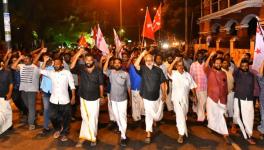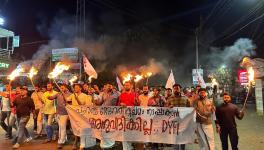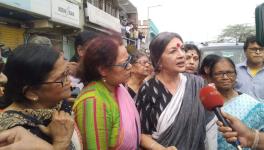Tamil Nadu: Can Consenting Adults Marry Without Parental Permission?
A young couple in love nervously waiting outside a government office to be soon pronounced husband and wife while the woman’s family barges in with rowdies trying to disrupt the marriage, is a familiar scene in Tamil movies. However, this is also a mere reflection of society.
Although, as per law, two consenting adults can marry despite opposition from their families, the process is not so simple. Government officers want to minimise the backlash by angry family members and caste organisations; they thereby summon the couple’s parents during the marriage registration process.
This is primarily a hurdle for inter-caste and inter-religious marriages, which almost never happen with the prior consent of families. In fact, the practice of summoning parents has evolved as a means to prevent such unions of personal choice.
Instead of addressing the issue and following the law, a circular was released which further impeded inter-caste marriages during the previous All India Anna Dravida Munnetra Kazhagam (AIADMK) government.
THE CONTENTIOUS CIRCULAR
In September 2017 the Chief Registrar's office in Chennai passed a circular addressing all sub registrars, district registrars and associate registrars. While the circular did not explicitly ask for the physical presence of parents, three out of its four points implied communication with parents. Since then the presence of parents at the time of marriage registration has become an unwritten rule.
While the circular is not explicit in asking for the parents’ presence, insiders say that oral instructions were passed down to officers to mandatorily demand the presence of the woman’s parents at the time of registration.
Soon after the circular was passed, it resulted in a hue and cry in the state. However, three and half years later the practice of summoning parents is firmly in place, and it is valid for whichever Act one chooses to be married under. This is the scenario in a state that prides itself on anti-ritual and anti-caste marriages.
CIRCULAR OVERPOWERS THE LAW
Rashmi and Bharanidharan were married in a small ceremony earlier this year, but when they had gone to register the marriage they were denied on dubious grounds.
Speaking to Newsclick, Rashmi said that “a few days after we filed the online application form, we got an appointment to submit relevant documents in the Neelankarai Sub-Registrar’s office in Chennai. At the government office we were shocked to hear that the officer would not register our marriage without the presence of my parents. They did not insist on Bharani's parents being present, however."
“We were given an appointment at the onset of the COVID-19 second wave, and I did not want to take my parents to a government office fearing exposure to the virus. Moreover, it is not mandatory to bring parents and we had legitimate witnesses,” she said. “We waited for over two hours arguing with the officer, but he refused to budge. Of course he couldn’t cite the lack of my parents as the reason for rejection, he conveniently changed it to doubts about our wedding,” she added.
Rashmi and Bharani have since been struggling to get their marriage recognised by the state.
Bharanidharan raised the issue with the Chief Minister’s Special Cell, an online petition filing and monitoring system; three months later, he has still not received a pertinent response.
Srinivasan, who witnessed something similar, said that “last year, in the midst of the pandemic, I was helping my friend’s son with his marriage registration. The sub-registrar refused to register their wedding citing risk factors involved without the parents being present. We insisted that he should go by rules and not risk factors. Ultimately, the parents had to send a letter of consent and only then was the marriage registered”.
ACTIVISTS FIND A WAY
A staff member at a sub-registrar office in Dindigul, who wished to remain anonymous, said that “we insist that parents be present at the time of marriage registration, but it is only to prevent any untoward happenings”.
However, when women’s rights, youth and political activists are involved, the norms are diluted.
“We have been instrumental in the marriage registration of many couples. The officers always demand that parents be present, but we insist that it is not needed as per law, and only are the weddings registered. It involves talking to and convincing the officers,” said Chitra from the All India Democratic Women’s Association.
Suresh from the Democratic Youth Federation of India said that he has helped many couples get married without parents being present. "People come to us because their families have disapproved of their decisions; we go along with them and ensure that the process is complete," he explained.
While couples who approach such organisations escape the brunt of the circular, those who do not generally face the repercussions.
“Summoning the parents for marriage is against Article 14; it is unconstitutional and the state cannot demand it. I have been wanting to go to court and quash the government order that highlights the importance of parents for marriage registration. I will soon do it,” said Lalitha, an advocate.
"With the present government in power it will not be difficult. We can easily demand the revocation of the GO," she mentioned. The order was passed in 2017 at a time when the AIADMK was in power.
Get the latest reports & analysis with people's perspective on Protests, movements & deep analytical videos, discussions of the current affairs in your Telegram app. Subscribe to NewsClick's Telegram channel & get Real-Time updates on stories, as they get published on our website.
























